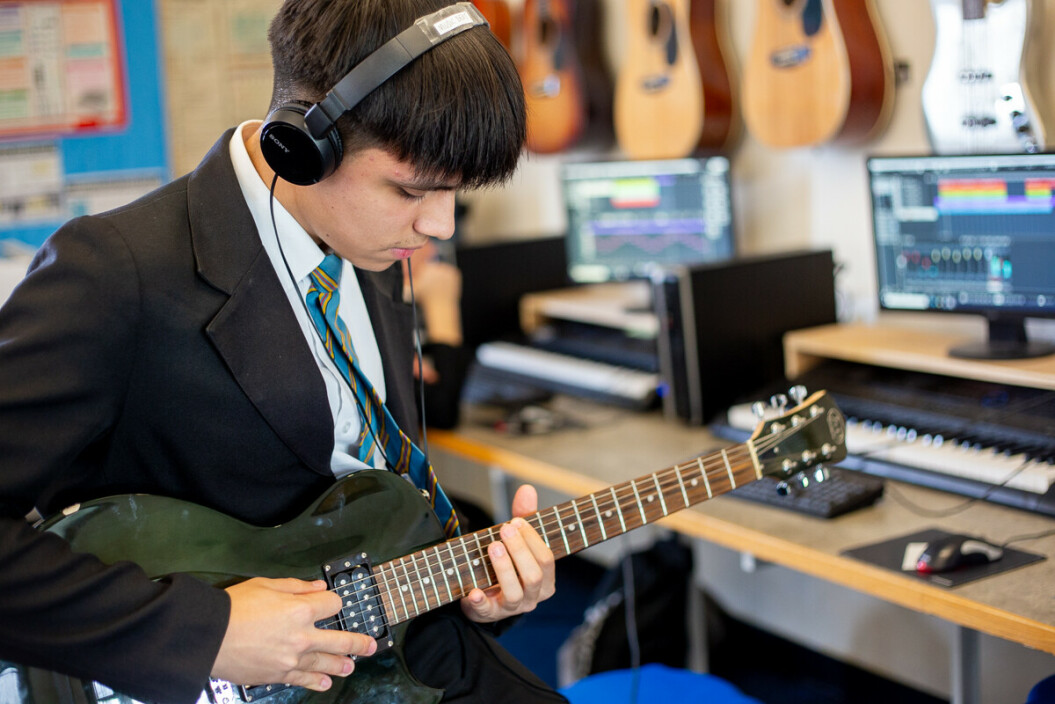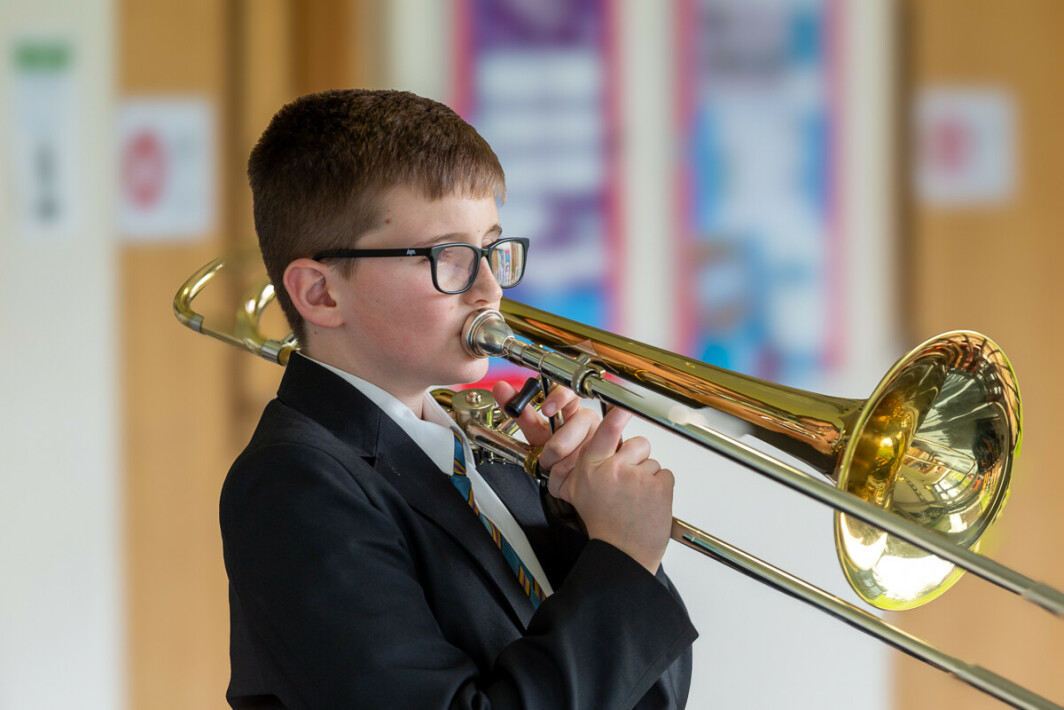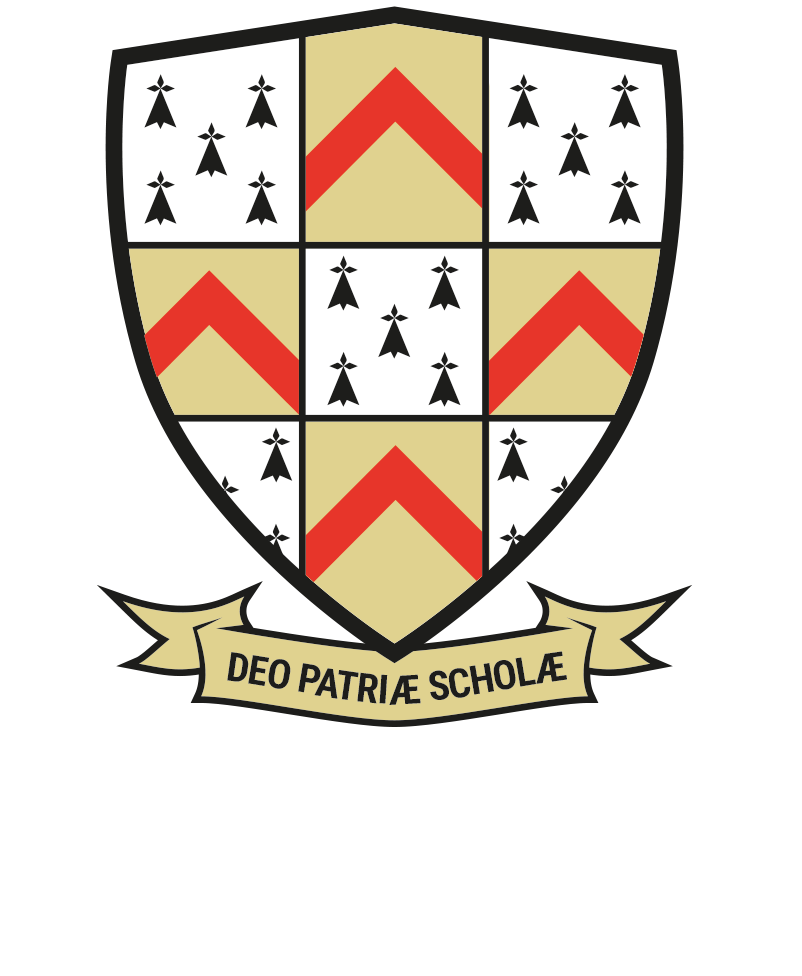Music and Music Technology
Lead Secondary School in Staffordshire
We have been chosen as the 'Lead Secondary School in Staffordshire' within The Music Partnership.
The Music Partnership is a group of the West Midlands leading quality music education providers, committed to working together to ensure all young people have the opportunity to sing, learn an instrument and perform as part of an ensemble or choir.
As the lead secondary school in Staffordshire we will be working with the partnership and other regional lead schools to provide additional support and capacity for music in the region.
Curriculum overview
Overall Intent
We offer a well-resourced, supportive and enthusiastic Music department. We are a bustling department with a hive of activity both within curriculum lessons and through extra-curricular offerings. Whilst delivering music to all students up to the end of Year 9, we also deliver over 230 instrumental lessons a week and facilitate 14 different groups/ensembles at lunchtimes and after school. We are committed to supporting our students/musicians in making strong progress at all levels and nurturing a genuine desire to succeed. Whilst providing a wide range of high-quality musical experiences both inside and outside of the classroom, students also nurture creativity, entrepreneurship, independence and confidence in pursuing new ventures. Covering the full range of composition, performance and analysing a broad range of music, we nurture students in their own technical proficiency, whilst encouraging a curiosity to discover new concepts and approaches to their work.
Our curriculum is separated into four broad areas:
- Developing instrumental proficiency
- Creating new music
- Finding inspiration in other music
- Challenging our own preconceptions
The ability levels and speed of progression of our students is wide ranging with some having had very little interaction with music at primary school, whilst others are studying at a Grade 5 instrumental level (beyond the instrumental level expected at GCSE). We therefore introduce additional layers of scaffolding, alongside opportunities for high-achieving musicians, which actively encourages students to use musical words in their ever-day musical conversation and responses in the classroom.
At Key Stage 3, between 10% – 20% of students go on to study GCSE music. This means the curriculum is tailored to remain appropriate and meaningful to those who will not study music further, whilst also challenging for those who will. Beyond this, our students gradually refine their own creative approach and specialise in their preferred pathway. Our courses aim to facilitate this journey and provide the high possible standard of education to our learners, equipping them for the next stage in their journey.

Key Stage 3
Creating Music
Students are regularly given the opportunity to include compositional elements in all projects. There are also dedicated projects to help students develop the skill of creating music and covering new compositional concepts. Projects such as 'Scary Music' are built around teaching core compositional concepts that will provide inspiration and skills to achieve success in this topic. They are then required to apply them in their own way. In other cases, students might be learning a performance piece but guidance is given to how they might adapt it through including improvisation or introducing their own elements – this is very much encouraged in order that students are not only mastering techniques but also adapting/creating their own interpretation. As technology continues to be an important force in film, producing and writing music, we are introducing more topics centred around how students can capture and develop their ideas with the aid of software.
Exploring different styles of music and raising awareness
All topics include learning about the context, history and techniques of a style of music or particular piece of music that enables them to develop both instrumental and performance skills. Across the curriculum, our aim is to cover a broad range of music and composers so that students can be better informed about the music they make, create and listen to. Students are introduced to tier 3 musical vocabulary from Year 7 so that they can broaden their understanding, interpretation and communication regarding what the music is doing. We have developed our own departmental approach (DR PATT SMITH’S Elements of music) alongside specific strategies for covering more general tier 2 words so that students are able to understand what is being asked of them at GCSE. This is further emphasised by the use of badges within the department, which actively encourages students to use musical words as their every–day musical conversation and responses in the classroom.
Achievements
Achievements break down the bigger learning journey into smaller individual steps in their learning. An achievement can encapsulate a micro-skill that has been obtained (e.g. strumming pattern or applying a particular compositional device) or knowledge that has been learned/recalled (contextual knowledge of a style of music). The achievements tie in with sequence of lessons, so that lesson learning objectives are tied in with achievements. Achievements are filled in by the students themselves so that they can take ownership of them whilst being guided carefully through criteria that have to be hit to be awarded them. Students are then able to visually see their own progress as a learning journey, develop independence and also break down the concepts that they can potentially reapply in other areas of the course.
Badges
Vocabulary
Students are required to know a wide range of vocabulary at GCSE in response to what they hear in the music, so we aim to embed this from Year 7. A badge can be awarded to a student whenever they use a musical word appropriately when responding to an open question in the lesson or through their written responses in listening work.
Performance
Badges can be used to promote the use of techniques that are often forgotten or seem too small to be important e.g. students counting in properly at the beginning of a performance dramatically increases the likelihood of ensemble success. These are considered quick wins and again can be awarded while students are rehearsing to highlight positive steps towards success.
Trophies
Trophies are awarded when a student demonstrates a particular streak of strong performance in any area of the topic, through a certain number of badges achieved or a number of achievements.

Key Stage 4
We deliver the Eduqas GCSE in Music. We have students displaying a wide range of skills and abilities and our aim is to stretch and challenge all students. In order to further assist students in their progress, we offer to cover the cost of instrumental lessons if they are taken in school, which is particularly helpful for students that may have seen their interest grown in later years.
Students pursue three main areas of study:
Composition
Students write two compositions across the two years; one is a free composition and can be in any style and another is responding to a chosen brief, which again can be in a range of skills. As a part of this, students extensively learn how to use their instrument to compose, how to use music technology to best present their ideas, whether that be notation software (Sibelius) or studio production software (Cubase).
Performance
Students are expected to perform for a minimum of 4 minutes in both a Solo and Ensemble performance. Students are given multiple attempts at this in order to capture their best work.
Listening and Appraising
Students study in detail a range of styles of music from across history. They are taught to communicate clearly their observations using a broad range of musical vocabulary in both short and long answer form.
Within the GCSE, we take the opportunity to further emphasise the importance of how performance, composition and listening are all interlinked and together form the whole musician. We are still very much focused on ensuring students understand the many ways that music can play a part in their lives, whether that be to pursue as an eventual professional interest or a subject/skill they are passionate about and will benefit them in many ways. The skills developed remain the same but students are expected to be able to explore and demonstrate a higher level of outcomes.
Staff
The following members of staff form the Music and Music Technology department at King Edwards:
| Staff Member | Job Title |
|---|---|
| Mr S Willey | Head of Department |
| Mr J Hampton | Audio-Visual (Media) Technician and Teacher of Music Technology |
| Mrs M Jennings | Achievement Leader (Year 10) and Teacher of Music |
| Miss S Winch | Teacher of Music |
Extra-Curricular
The school’s extra-curricular provision is diverse and exciting. There are over 200 students involved in the extra-curricular music activities listed below:
- School Orchestra (All levels welcome)
- Jazz Band (Grade 3+)
- Junior Choir (Years 7 - 9)
- Senior Choir
- Fuse Band (Parts written for students of all levels)
- Flute and Clarinet Ensemble
- Brass Ensemble
- Percussion Ensemble
- Music Technology Club (All students welcome)
- Girls’ Choir
- Guitar Ensemble
- Keyboard Ensemble
Annual events
Below are a list of the annual events that take place at King Edward VI School, Lichfield which the music department and it's students take part in:
- School Dedication Day Service
- PTA Christmas Fayre
- Annual Carol Service at Lichfield Cathedral
- School Production
- Spring Concert
- Summer Festival
- Transition Singing Day
- Unplugged Series

